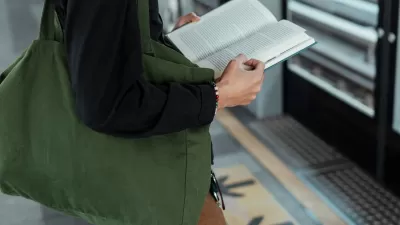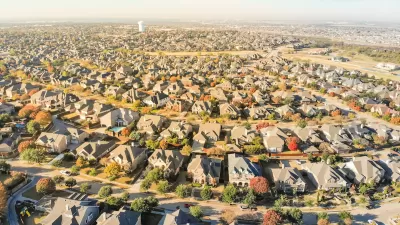In this excerpt from her new book, "Before the Lights Go Out" author Maggie Koerth-Baker warns of the converging crises of peak oil and climate change on suburban areas.
Using Merriam, Kansas as an example of the typical American suburban environment, Koerth-Baker considers the impacts of what the current science predicts will be a hotter, wetter world with less and more expensive oil:
"Metro towns aren't self-reliant. Their fates have been tied to the fates of the towns they touch for decades. That interconnection works now because gasoline is cheap. What happens to a metro town when travel from one part to another is no longer easy and frequent, no longer something that can happen daily or hourly? What happens when the parts of a metro can no longer rely on the direct support of all of the others but are still on the hook for funding shared systems? What happens to the city at the metro's heart when it can no longer count on the social support, the financial investments, and the intellectual capital of people who actually live elsewhere?"
We have two problems: our metro lifestyles require energy, but we also want to avoid the negative impacts climate change and peak oil will have on metro communities."
FULL STORY: Spread Reckoning

Planetizen Federal Action Tracker
A weekly monitor of how Trump’s orders and actions are impacting planners and planning in America.

Restaurant Patios Were a Pandemic Win — Why Were They so Hard to Keep?
Social distancing requirements and changes in travel patterns prompted cities to pilot new uses for street and sidewalk space. Then it got complicated.

Maui's Vacation Rental Debate Turns Ugly
Verbal attacks, misinformation campaigns and fistfights plague a high-stakes debate to convert thousands of vacation rentals into long-term housing.

In California Battle of Housing vs. Environment, Housing Just Won
A new state law significantly limits the power of CEQA, an environmental review law that served as a powerful tool for blocking new development.

Boulder Eliminates Parking Minimums Citywide
Officials estimate the cost of building a single underground parking space at up to $100,000.

Orange County, Florida Adopts Largest US “Sprawl Repair” Code
The ‘Orange Code’ seeks to rectify decades of sprawl-inducing, car-oriented development.
Urban Design for Planners 1: Software Tools
This six-course series explores essential urban design concepts using open source software and equips planners with the tools they need to participate fully in the urban design process.
Planning for Universal Design
Learn the tools for implementing Universal Design in planning regulations.
Heyer Gruel & Associates PA
JM Goldson LLC
Custer County Colorado
City of Camden Redevelopment Agency
City of Astoria
Transportation Research & Education Center (TREC) at Portland State University
Jefferson Parish Government
Camden Redevelopment Agency
City of Claremont





























